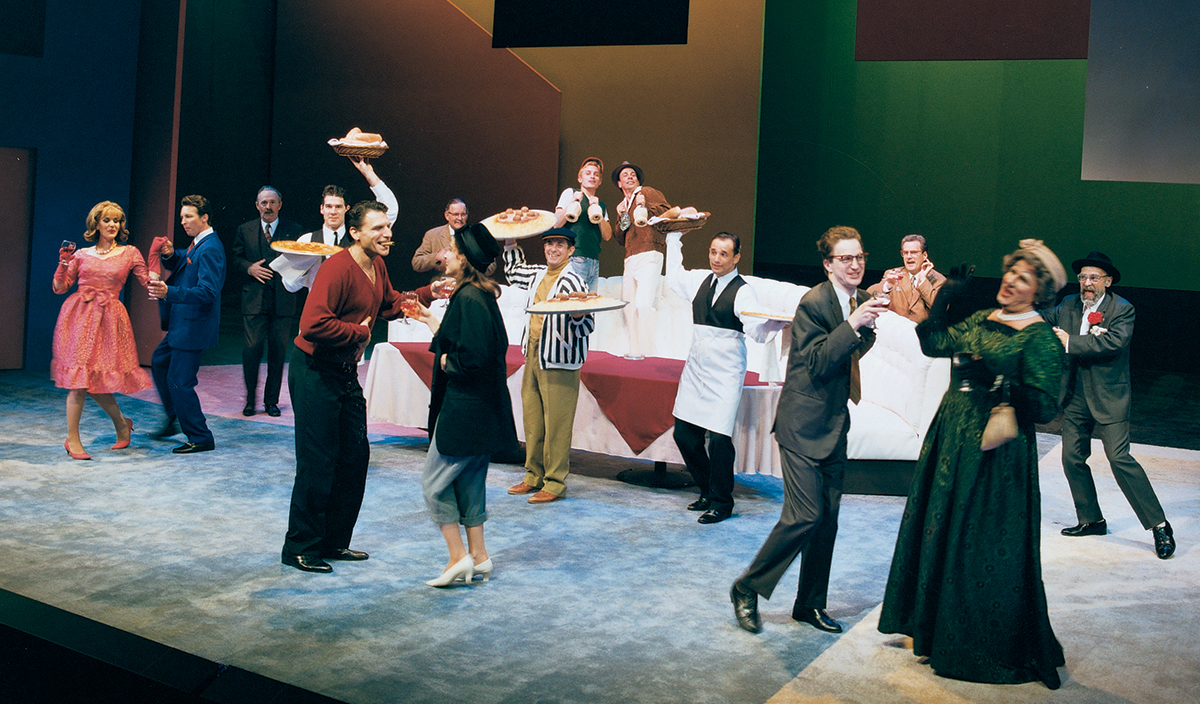Act II, Sc 2: All's Well in the West
Mark Rucker hated being told to do Shakespeare the way it's always been done. "A lot of festivals have a sort of 'Hey, nonny nonny' sensibility, where you have to do a Renaissance Faire version of these plays," he said. "They have an investment in being a kind of museum for Shakespeare. I understand that aesthetic, but I don't agree with it."
Three subscription seasons before Rucker made those comments to Orange County Register Theater Critic Paul Hodgins in 1998 [ 11 ], SCR's brochure carried the first listing of Rucker as director of a Mainstage production. The Taming of the Shrew would be strategically timed to find the soft spot in local school schedules and field trip budgets. In addition to booking student groups into regular performances, SCR's Theatre Discovery Project meant adding weekday morning shows for high school students at the same impressionable age Rucker had been when he attended SCR's production of George M. Cohan's The Tavern in 1973.
Auditions and design meetings for Shrew started in late 1995.
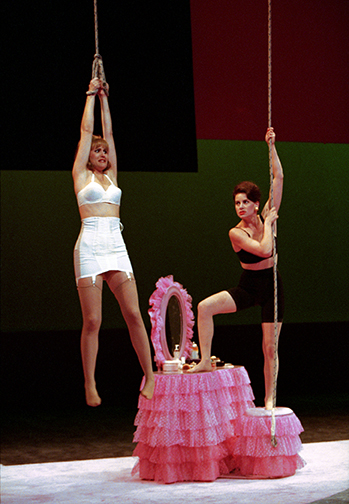
"He came in with the concept of a 1960s Mafia/Brooklyn setting," said SCR Casting Director Joanne DeNaut. "He had all these visions: He said I think 'I'm going to have Petruchio enter on a motorcycle.'"
To ride the motorcycle he cast Marco Barricelli, asked Cindy Katz to be his Kate, and introduced Schulman to SCR as Bianca.
"I had recently re-read Shrew," Katz said. "And I had this, to me, revelation. It just leapt off the page as this love story of two equals. And when he asked me if I wanted to do it, I actually said, 'I don't think I can do this play if it's not ultimately a story about these two characters meeting on equal ground.' And it wasn't like that was any sort of revelation to him. He was just like, 'Yeah, I can see that.' It was an example of his miraculous combination of strong vision and utter openness. His concepts were firm and inspired and still the interpretive fluidity remained."
"My main goal in doing any play is to try to breathe life into it," he told Hodgins. "And that usually comes from letting the play speak to you and getting a group of people working together – people who may or may not follow your instincts.… It's about making things come from the text and bringing this old language to life; and [about] a healthy disrespect for some of the techniques that are common practice. You always have to make the words seem real."
Don Shirley's Los Angeles Times review agreed. "Rucker's candy-colored concept of setting Shrew within a fantasy world of East Coast '50s/'60s Rat Pack/Cosa Nostra culture yields so many laughs on its own that any hisses arising from the script become part of the fun, as at a 19th Century melodrama."
"I will say it felt like magic," Katz said. "It really felt like all these great things coming together. It was just so freeing and felt like such a group creation, with Mark as the spearhead and the captain. It was definitely one of the top experiences I've ever had working in any medium."
His trajectory continued to rise through the second half of the 1990s. The same year as SCR's Shrew (which earned his one LADCC Award), he worked with David Mamet and John Guare on Yale Rep stagings of The Cryptogram and Landscape of the Body, respectively. The following year he directed Donald Margulies' The Model Apartment in La Jolla, Steven Dietz' Dracula at San Diego's Old Globe, and Anna Deveare Smith's House Arrest: First Edition at the Arena Stage.
His relationship with his partner had never been better, helped by Di Loreto's shift to producing as the decade came to an end. As Brent Roske would write for the Producers Guild of America in 2012, "The '90s were a transitional period for Di Loreto. Considering his timeline on IMDb, you can see how his acting career finally ground to a halt. After playing ‘Emcee’ on an episode of 'Cheers' in 1991, nothing posts for almost the entire decade. … In 1994, however, a very interesting project pops up called Waving, Not Drowning … and the project has Di Loreto listed as the producer. … And once he got on track, he gained momentum — real big crazy momentum — quickly." [ 12 ]
When Roske asked Di Loreto what qualities every producer should possess, his list began with "Patience — great things sometimes require great timing, and finding success may mean knowing when to wait."
| | |
Marivaux's The Triumph of Love, which ran in February 1997 at SCR, was a production that, as Rucker told Hodgins, "was telling me, 'This is the way this one needs to go.' Every production tells me that. You may not please everybody in terms of the way you've served the play, but it works best for the production and in that sense it's more alive for an audience – more engaging and stimulating – than a 'proper' version would have been." [ 13 ]
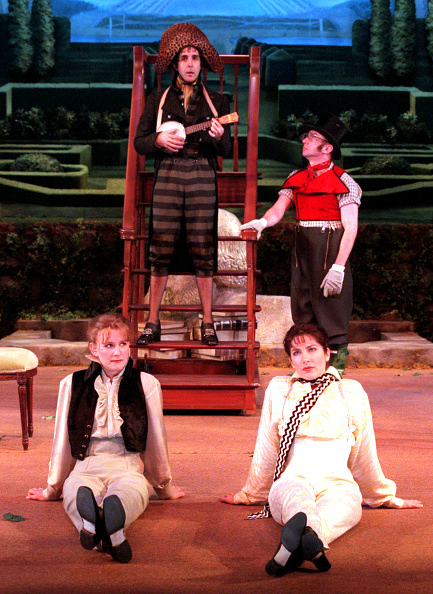
"His Triumph of Love … in fact embraces contemporaneity," was Laurie Winer's takeaway for The Los Angeles Times. "The particular callousness of its heroine and the deadpan of its clowns would not be out of place on a prime-time sitcom. Richard Greenberg (Eastern Standard, Night and Her Stars) has loosed his irreverent wit on The Triumph of Love, featuring overt references to homosexuality, an electric leaf blower and a Sheryl Crow song, played on the banjo." [ 14 ]
Winer found the cast "likable," noting that the lead "has an open charm that could have been used to suggest a more altruistic motive for the princess, who after all is trying to reunite a divided kingdom." The actress was René Augesen, and she had charmed not only SCR but San Francisco's ACT, where its Artistic Director, Carey Perloff, wanted to cast her in an upcoming Streetcar with Barricelli already on board.
As Perloff would write in her 2015 memoir, Beautiful Chaos, A Life in the Theater, "In casting a Stella to play across from Marco in A Streetcar Named Desire, we discovered an actress right out of Yale named René Augesen, who astonished us with her power, sexuality, and honesty even on videotape. … [but] turned out to be unavailable." [ 15 ] Within a few years Augesen would join Barricelli, Steven Anthony Jones and Gregory Wallace as the cornerstones of ACT's core acting company.
Augesen is the younger sister of Roxana Augesen, a Yale classmate of Rucker's who appeared in his Stage Door thesis. She had followed her sister into Yale a few years after Rucker graduated.
"I graduated in '96 and did a couple jobs right away," she said. "I went from job to job and then the first time I was unemployed I got sent on an audition for Triumph of Love at South Coast Rep and it was him. I knew of him from my sister and because he came back to Yale to direct a couple of things. I wasn't in any of them, but I had seen his Twelfth Night and it was marvelous, just marvelous.
"At the audition," she continued, "there was a mix-up with the scripts because Richard Greenberg was adapting and we didn't have his version yet. And Mark was just really, really kind and lovely and worked with me. We got on really well, and I actually received the call that day that he wanted to use me."
| | |
In Spring 1997, following his remounting of Taming of he Shrew at Seattle's Intiman Theatre, with Katz, Barricelli and most of his cast, Rucker became SCR's fourth Associate Artist, following Chambers, Playwright Craig Lucas and designer Michael Devine. It implied an open and ongoing working relationship with the theater and helped secure Rucker's standing as a director of importance.
The theater's show of confidence added weight to the growing critical consensus that Rucker had originated a signature style. While it was not something he could tap on every assignment, for the right big-canvas revival of a classic, it held the promise of added clarity and excitement. But, like Lubitsch or Capra on the big screen, Rucker's stylistic touch was never formulaic or an end in itself. As Hodgins put it, "A radically Ruckerized play always seems, somehow, intrinsically right. … Rucker gave The Taming of the Shrew an Italian-American milieu – New York, circa 1959 – and the setting breathed new life into Shakespeare's merry but hard-edged tale of the war between the sexes. The Runyonesque demimonde of tough guys, tougher gals, and ironclad sex roles fit the story like a glove. It also pleased the public – his Shrew remains one of the most successful productions in SCR's 34-year-history…." [ 16 ]
To be sure, not every outing landed with the critics. The century curtain closed with a Yale Repertory Theatre production of Molière's The Imaginary Invalid. It was a new adaptation by James Magruder, and featured Raye Birk, Veanne Cox, and Scheie. The New York Times' Alvin Klein accused the director of "the sort of out of control staging that plays childish (that's less than sophomoric) games with reconstructionism, deconstructionism and all those other faddish theater buzzwords." TotalTheater.com, despite acknowledging Scheie's "quirky charm" with a musical interval, labeled it "the kind of irresponsibility that has permeated the program under Stan Wojewodski, Jr.'s ninth year as artistic director." The Newtown Bee called it "just plain godawful." [ 17 ]
Whether the staging was a misstep or simply beyond the pale of traditionalists, his own direction continued to be upwards as the new millennium rose on the horizon. With it appeared the promise of another SCR Shakespeare production and a chance for lightening to strike a second time. Perhaps even brighter.
| | |
For SCR's 2000-01 Season, the Theatre Discovery Project was again Shakespeare, again a comedy, and again handed over to the high-flying Rucker. As with Katz and Barricelli in Shrew, he again found the right match for the battling lovers at the heart of the story. His Spring 2001 Much Ado About Nothing featured Nike Doukas and Douglas Sills, charismatic veterans who, like Beatrice and Benedict, had the added chemistry of being longtime friends. They had been close since their days in ACT's Master's program.
Doukas, who said she "first worked with Mark at Shakespeare Santa Cruz in Our Town," had made her SCR debut in Rucker's staging of Loot. Sills had only worked with him once, at Antaeus Theatre Company, where Sills was a Founding Member. It was a reading of Cat on a Hot Tin Roof, with Doukas as Maggie.
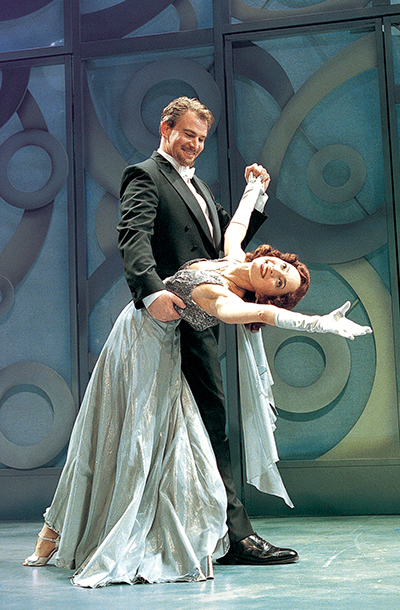
"One of the important things a director brings is a strong hand on the wheel," Sills said. "And Mark always had a strong hand on the wheel. He wasn't gripping it out of fear, so if you had another idea, he could turn the boat very easily. He didn't have a big problem with it. But if what was called for was a strong hand, and telling someone 'No, this is what it is and here's why,' he could do that as well."
Sills remembers hearing Rucker's concept for Much Ado.
"He and I understood each other pretty well," he said. "We were all inspired by the same movies that we watched as kids with our parents, and Mark and I loved those movie musicals. But with Much Ado it was always about getting at the text and the relationships, particularly between Beatrice and Benedict, and how love comes and goes and finds you unexpectedly. And, of course, about the comedy." [ 18 ]
The musical curtain call in Taming of the Shrew, which had the actors follow their bow-taking with full-cast dancing to Rosemary Clooney's "Mambo Italiano," had the effect of turning the inevitable standing ovation into audience-wide clapping to the beat. Some who saw it recall the theater felt like a nightclub with actors and audience in rhythmic unison. Rucker wanted to tap that wellspring again.
"When he got an idea, he would get this twinkle in his eye," Sills recalled. "And then use the resources that SCR had or call in a friend like Art Manke and say this is sort of what I'm thinking … How can I do this?"
Manke was a freelance director and choreographer who coincidentally had been in the same ACT class with Sills, Doukas and Playwright Amy Freed. He also had been the one in 1995, when he was still running A Noise Within with co-founders Geoff and Julia Rodriguez Elliott, to hire Rucker to direct A Doll's House.
"He basically said we're doing this production, Douglas and Nike are doing it, it's going to be in the '30s, and I want a big fabulous tap-dancing curtain call with the entire company," Manke recalled. "I think that he had done a tap-dancing finale in a production at Yale Rep, and it was something that he was starting to make a bit of a signature in some of his work.
"He had such an encyclopedic knowledge of film and film musicals and particularly the '30s," Manke continued. "I went off and rented old Hollywood musicals and got the sense of what those were and tried to emulate them. What made it extra special was that it wasn't expected, like getting a dessert with sparklers in it. It took the whole piece to another level."
"We started rehearsing the curtain call early," Sills added. "And we rehearsed it a lot. There was no improv or ad lib. It wasn't Busby Berkeley but it definitely had a flavor of that and it was very funny to see mostly non-musical theater actors performing dance choreography."
Extended curtain calls are risky business. If a show hasn't gone well, an audience will be put out if required to hang in while the cast milks lukewarm applause. William Ball, the founder and longtime Artistic Director of ACT, was perhaps the most outlandish. He would end a season with a curtain call at the final performance that saluted every show that year and lasted up to 15 minutes. [ 19 ] Such was not the case with Rucker's Much Ado About Nothing.
"Although I had some trepidation during rehearsal, and concerns that it could fall flat, I was definitely wrong," Sills said. "It worked great."
It clearly worked for Variety critic Steve Oxman, who wrote, "Beginning with music that recalls 'Hooray for Hollywood' and ending with a big tap-dance number that serves as a joyous curtain call, director Mark Rucker's production of Much Ado About Nothing at South Coast Rep infuses the Shakespearean comedy with the sensibility and style of a film from Hollywood's Golden Age. Fast-paced and frothy, this screwball approach works like a charm, delivering a boldly colorful show filled with spirited performances, particularly from Broadway leading man Douglas Sills as Benedick.
"It takes a little while for the conceit to kick in," Oxman continued, "but once it does, the play hums along on a Capra-esque cloud. Rucker’s choices here are tailor-made for the Beatrice and Benedick scenes, where the dueling wits exchange insults belying the sexual tension between them. As always, these are the best scenes in the play, with Nike Doukas and Sills going at it with verve. You know the production is working when Beatrice famously commissions Benedick to violence, and the order — 'Kill Claudio' — generates the biggest laugh of the evening, just as it should." [ 20 ]
Sills and Manke earned Los Angeles Drama Critics Circle Awards, respectively, for performance and choreography.
ACT II, SC 3: New Directions
Back on January 1, 2000, the world had awakened to find global timekeeping was still on track and the much ballyhooed Y2K catastrophe a non-event. For Rucker, time was on his side as change seemed to bring more security and a renewed sense of purpose: He would complement his work energizing classic plays with more work encouraging playwrights in the development of new scripts.
A percentage of American theaters were dabbling in new play development, but it cost money and relied on a supportive audience. Subscription rates that had allowed theaters to front-load their annual budgets with a season of advance – albeit discounted – ticket sales, were declining across America. One of the most committed institutions was SCR, where the same year Rucker became an Associate Artist it announced its first Pacific Playwrights Festival (PPF) for Spring 1998.
As the new century arrived, Rucker had already directed three SCR premieres: So Many Words back in 1993; a wild update of Aristophanes' The Birds by Culture Clash and SCR Literary Manager John Glore in 1998, and Glore's On the Jump as the cornerstone world premiere of the second PPF in 1999.
His stock-in-trade, however, remained revivals and remountings. In Spring 2000 he directed SCR's West Coast premiere of David Hare's Amy's View, then Yasmina Reza's Art there that fall, followed by the aforementioned Much Ado in Spring 2001. He participated in that season's PPF by directing the staged reading of Annie Weisman's Hold Please.
"He wanted to do new plays, because no one thought of him as a new play director," said Weisman Macomber, who had grown up in the Southern California beach town of Del Mar. Bound by the shared experience of adolescents in paradise who preferred indoor play reading and theater going, theirs would be one of either's most intimate friendships.
"SCR had this commission from me and they just hooked us up. It was totally an arranged marriage," she continued. "And I felt really grateful to work with him. He never approached the play like it was broken. A lot of times a new play director acts like a doctor: The play's sick and they're going to fix, or heal it. He approached it like it was this imperfect perfect thing, the way you approach Shakespeare. A writer loves that. You love feeling like he was just sort of figuring it out. His inquiry into those corners of the play that were messier or less finished helped you discover where you needed to do the work and fix things. It was very clever, generous and collaborative."
Jerry Patch, who was SCR's Dramaturg at the time, remembered that, "When Mark did play development and premieres with us he was always above all in service to the playwright and the playwright’s conception. He was always trying to find the best way to realize the playwright's objectives, and could talk about alternatives in collaborative ways that introduced other options but always left the writer in charge. Playwrights loved working with him, and would do so again."
The reading of Hold Please was successful enough for it to earn the opening berth of SCR's 2001-02 Second Stage Season, with Rucker directing. First, however, he was off for another Shakespeare production, his first work for California Shakespeare Festival, or Cal Shakes, in the Bay Area city of Orinda.
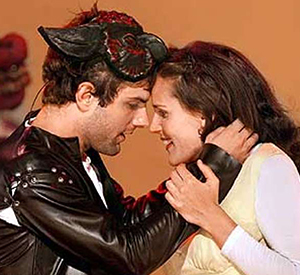
Romeo and Juliet, with Adam Scott and Schulman in the title roles, was another bold vision in which "youthful energy is the key to Rucker's version," according to the San Francisco Chronicle's Robert Hurwitt. He was especially impressed with "Schulman's buoyantly adolescent Juliet, so wonderfully impatient awaiting Romeo that you can feel her skin tingle … [She] grows nicely in the role, maturing in her lonely deception of her parents and capturing the horror of her awakening in the tomb." He also liked "the impatient mockery and edgy combativeness of Danny Scheie's Mercutio, … that builds inexorably to Scheie's fierce battle with Michael Wiles' cool Tybalt." [ 21 ]
In September, rehearsals began on Hold Please. As Weisman Macomber recalled at SCR's Rucker Memorial and again in her contribution to an American Theatre tribute [ 22 ], she had become frustrated at the end of a long day of tech rehearsal when her director seemed insufficiently tough on a cast member.
"An actress wasn’t getting her lines right, and Mark insisted on being calm, patient, and understanding with her," Weisman Macomber said. "It was infuriating. Obviously he didn’t care enough."
She "stormed out of the theater in tears on Monday, September 10, 2001." The next morning she awoke to images of the Twin Towers crumbling and immediately called Rucker, "feeling foolish and ashamed of myself. I wanted to go give blood to people at Ground Zero. … I didn’t see the point of doing my play any more. I wanted to quit. I was scared and confused. A total mess. Mark wasn’t. He was calm, patient, and understanding. Just like at tech the night before. 'Annie, you’re a writer. This is what you have to give.'"
Between its 2001 productions of Much Ado and Hold Please, SCR had two significant premieres: David Lindsay-Abaire's Kimberly Akimbo and Amy Freed's The Beard of Avon. The latter, an SCR commission, had been submitted three years earlier, in 1998, when Rucker was first an Associate Artist, with a shared desk in SCR's Literary Department, reading incoming scripts. He had asked to direct that fall's in-house reading of Freed's draft. These fully cast, script-in-hand readings were standard for important submissions, and allowed the Artistic Directors and Literary staff to assess the play's potential and provide suggestions on further development that could earn a production slot.
"Mark was so unequivocally, absolutely delighted from the first moment with that play," Freed said. "He didn't have hesitation about anything, artistically or comically, and did a wonderful job directing the reading. For someone who could be so playful and so loose, he also had a pretty refined sense of what was funny. He didn't direct it on a buffoon level, but with intelligence, through character, nuance, timing, tone and pitch. He was really a gift for my work, because he had boldness but also great taste."
Although Rucker did not direct Beard's 2001 world premiere at SCR, it would play a far more important part in his career. While in the Bay Area to direct that summer's Romeo and Juliet at Cal Shakes, he was able to meet with Perloff, and agree on directing the January 2002 production of Beard that would be his entrée to ACT. [ 23 ]
| | |
Playwright Charles Busch's new century was also off to a bright start. His play The Allergist's Wife opened at the Manhattan Theatre Club on February 29, 2000 and after 56 performances moved to Broadway's Ethel Barrymore Theatre for a 777-performance run that earned Tony® nominations for Busch and actors Linda Lavin and Michele Lee.
The Allergist's Wife, which Ben Brantley had hailed in The New York Times as a "window-rattling comedy of midlife malaise on the Upper West Side," with "wall-to-wall laughs," [ 24 ] was Busch's first play written for a mainstream audience. A month before it opened, the film version of his play Psycho Beach Party had screened at Sundance. Busch's play easily transitioned to film as a comedy-horror parody of three period genres: 1950s psychodramas, 1960s beach movies and 1980s slasher films.
The previous year, while in Los Angeles for ten days of shooting the small part he played in the film, he had also been on stage in a new parody he had tossed-off to give his friend and past director Ken Elliott something splashy with which to introduce his work to Hollywood. In a 2014 interview with New Conservatory Theatre Center Founding Artistic Director Ken Decker, Busch explained that Die! Mommie! Die! (as it was first punctuated) was an update of the Clytemnestra myth told in the style of 1960s "grand dame guignol" films, of which Whatever Happened to Baby Jane? was the most successful. [ 25 ]
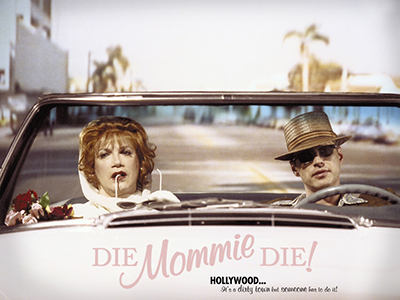
Di Loreto had formed a producing partnership with Anthony Edwards by this point. Now he and Rucker were looking for a project to be the theater director's first film. In 2003, Di Loreto told the Los Angeles Times' Mike Boehm that in the early Nineties, while watching an AFI screening of Bette Davis' Now, Voyager, Rucker "leaned across to me and said, 'Someday I want to do a movie like this starring Charles Busch.'" [ 26 ]
"In my recollection, Dante Di Loreto and Anthony Edwards had contacted me and my agent about adapting a book into a movie and I met with them," Busch said. "At that time I was doing the play Die! Mommie! Die! in L.A., which is where it first started out, and they came to see the play. I think that simultaneously Dante and Mark had been looking for a project to do together and so it all sort of converged."
Rucker told Busch he was a great admirer of his work and, that "he had always thought that if he was going to make a movie, he wanted to make a movie with me."
Busch recalled Rucker being "so organized."
"He had that movie so storyboarded and worked out in advance with Kelly [Evans], the Director of Photography," he said. "They were so in sync. It was so refreshing to see this first-time director who, I think maybe because he was from the theater, was so disciplined. We were in complete sync about everything."
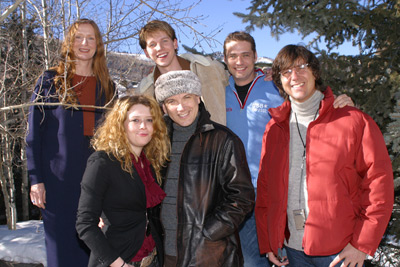
Die Mommie Die! was accepted to the 2003 Sundance Film Festival, which was held during ten unseasonably warm January days. Busch would win the Special Jury Prize for Performance and the film made the festival circuit that year. It went into wider release on Halloween, and after earning $320,000 at the box office, was released on DVD in 2004. [ 27 ]
"It was one of the happiest creative experiences I've had in my life and in my career, creatively fulfilling, exciting," Busch said. "It was a dream come true for me to star in my own movie. But so unfortunate and surprising that Mark never did any further movie or television work. He got nothing from that movie at all."
Rucker had to cut his Sundance stay short. SCR and Shakespeare were calling for rehearsals to begin on Two Gentlemen of Verona, which he would set in a bygone America of the 1950s, with poodle skirts, letterman sweaters, and a final scene in a Southwest desert where he outfitted many of SCR's founding actors as rebel bikers.
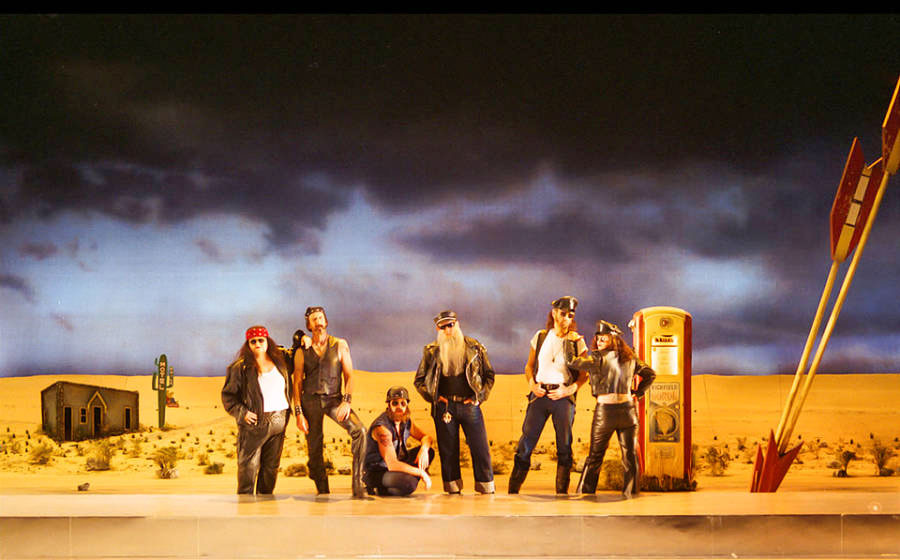
ACT II, SC 4: The Best Man
It was while Rucker was enjoying his lone movie-making adventure that the relationship with Di Loreto had its Hollywood ending – if a film breaking mid-reel qualifies as a Hollywood ending. Several close friends received a distress call after he discovered a fax confirming double-occupancy for his partner at their favorite Paris hotel. Rucker was suddenly the third man.
"I spoke to him later the same day," said SCR's DeNaut. "He was in such pain. When I saw him a few days later he was angry at himself for being so trusting and loyal … But that’s who Mark was."
"At that time, Mark's film was just coming out, and he'd come to London to premiere it at the Gay and Lesbian Film Festival, where it was lauded … absolutely sold out in seconds," Gornick said. "I wish he could have enjoyed it more. I'd never seen Mark like that.
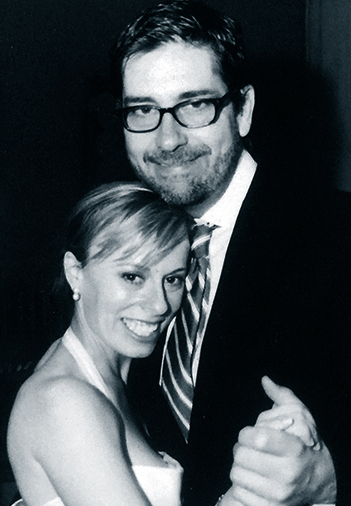
"He loved walking across London and we were doing one of our walks when we got into Tate Modern," Gornick continued. "I remember sitting in the Turbine Hall and … it was like somebody had blown a hole through his heart. He just sat with his head down, and we didn't talk."
"Our friendship was really forged in that fire around 2002 and 2003," Weisman Macomber said. "That period of time was so destabilizing for him and he kinda moved in with me for a while. His friends, 'Team Mark,' were very upset with Dante, but Mark was hugely understanding about it. He was pretty unlimited in his humanity, and never, ever felt a moment's bitterness about it."
Though he never worked with Weisman Macomber again after Hold Please, the two teamed up for theater trips to Broadway, drives to Las Vegas, and living room film festivals. They began referring to each other as 'Husband' and 'Wife.' When Weisman met William Macomber, a film editor who now owns the post-production company Fancy Film, she had some explaining to do.
"It was kind of touch and go there," she laughed. "Bill was like, 'Who's this guy?' 'Well,' I told him, 'he's my husband. … It's complicated.' So Mark and Bill bonded over that, and because I didn't know as much about the movies, and Bill was a film major at Wesleyan and studied with a woman named Jeanine Basinger, whose book about early cinema Mark really liked, they bonded over that, too."
In 2004, Rucker embarked on arguably the most demanding stage production of his career, SCR's season-capping Cyrano, using Anthony Burgess' translation of the Edmund de Rostand epic. Mark Harelik signed on early for the lead, and Schulman was his Roxanne.
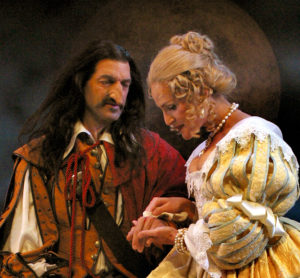
"I don't know any other director who could have put that show up in such a short amount of time," DeNaut said. "We didn't have the budget and the show was huge – I think we cast 30 people. We staggered the start dates to save money and asked everybody to work for scale. It was that kind of a thing. But, because it was Cyrano, and Mark Harelik, and Mark Rucker, it all came together. Everyone involved with a Mark Rucker production was always on their best behavior no matter how large the tasks. This was because he never made demands; always asked politely with a smile and when possible would just get on stage and do it himself. He just loved everything about the process and it was infectious."
The following year he directed the world premieres of Christopher Shinn's On the Mountain, with Schulman and Daisy Eagan, and Greenberg's The Girl on the Appian Way, then a Ford's Theatre staging of Ken Ludwig's Leading Ladies with John Astin, JD Cullum, Patrick Kerr, Charlotte Rae and Karen Ziemba. In 2006 it was back to New Haven for Yale Rep productions of All's Well that Ends Well and The Mistakes Madeline Made by Elizabeth Meriwether before returning to ACT for his second collaboration with Perloff. He directed her script, Luminescence Dating, which served as the first co-production with the Magic Theater and marked both institutions' 40th Anniversaries.
| | |
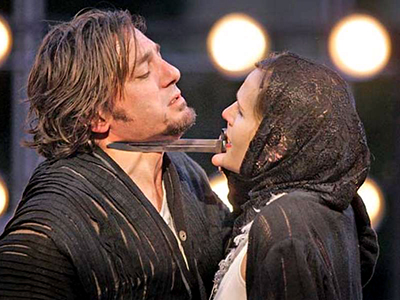
Michael Edwards had become Producing Artistic Director of Asolo Repertory Theatre in Sarasota, Florida in 2006. For his first season he called upon trusted friends Catherine Sheehy and Rucker to adapt and direct, respectively, Pride and Prejudice, which ran March through May 2007. He followed that with a second Cal Shakes show, Richard III with Reg Rogers as the bent monarch, and a Magic Theater public workshop with comedian Joan Rivers. Rivers' project would later become A Work in Progress by a Life in Progress, playing at the Geffen Playhouse in 2008, directed by Bart DeLorenzo [ Theatertimes Review of Geffen production ].
His third ACT outing was N. Richard Nash's The Rainmaker and its opening was unforgettable. SF Weekly's Chloe Veltman credited "Rucker's deeply affecting production" with nothing less than "a seismic shift" at ACT. The reviewer had attended the October 30 performance, when a "magnitude-5.6 tremor that hit the Bay Area a few minutes past 8 p.m. … caused the century-old building's walls to wobble like an old-fashioned wedding cake just as the lights went up…. But the shift that occurred at the theater that night wasn't merely physical. It was also artistic."
Veltman picked up on a quality that echoed what DeNaut said about a Rucker company's coherence. "The Rainmaker is, above all else, an actors' play, and the cast digs deep into the heart of Nash's drama to create an intimate bond between the play and us. I don't think I've ever seen an ACT cast look as if they're having as much fun as they appear to be having here. Their enjoyment is infectious." She took particular notice of Augesen, whose "performance as Lizzie Curry, the unhappily unmarried farmer's daughter and the sole female character of the play, is perhaps the most powerful." [ 28 ]
Rucker finished 2007 as he began it, directing for Edwards in Florida. Among those who reviewed Asolo's production of W. Somerset Maugham's The Constant Wife, Sarasota Magazine wrote, "The cast, well directed by Mark Rucker, is smartly up to the task of delivering Maugham’s boatload of clever lines with the type of British 1920s flair required."
In Ashland, Oregon, Bill Rauch was in his first season as Artistic Director. [ 29 ] He brought in his colleague to direct A Midsummer Night's Dream. Rucker followed that with a raucous summer 2008 staging of Twelfth Night at Cal Shakes. Response to "Rucker's camp-funfest staging of Twelfth Night," as Hurwitt described it, was mixed. "In a post-modern decadent Illyria," wrote the Chronicle critic, "the men of Orsino's court promise a gender-fluid overturning of social norms." Yet again, it was his old friend who made the outrageousness gel: "Irrepressible Danny Scheie most perfectly embodies Rucker's funfest concept as Feste, drawling sardonic quips as he skates about the stage in Clint Ramos' most outrageous costumes."
| | |
The Global Financial Crisis was officially a year old in November 2008, when America elected a charismatic new president, tall as Lincoln and young as Kennedy, whose balance of Anglo-Saxon and Kenyan African ancestry was a healthy sign for the country.
Mark Rucker's future was just as bright as he returned again to New Haven and a cast that included Rogers, Schulman, Greg Stuhr and Kerr. Tom Stoppard's Rough Crossing, a shipboard comedy adapted from Hungarian Ferenc Molnar's The Play at the Castle, was right in Rucker's wheelhouse. The Czech-born Brit drizzled the confection with irresistible wordplay and Rucker's staging found the right mix of silliness and substance. To take the tap-dancing climax a step beyond Much Ado he enlisted Michele Lynch, the choreographer who worked with him on Leading Ladies at Ford's Theatre and Pride and Prejudice at Asolo.
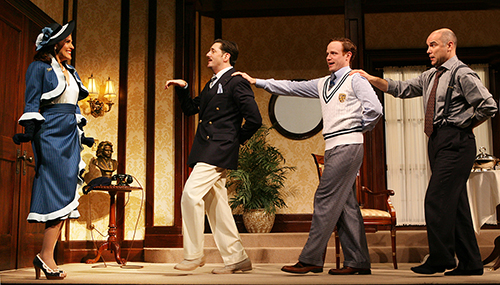
Stoppard had added three songs to Molnar's story, which had previously been adapted by P.G. Wodehouse as The Play's the Thing in 1926. The lyrics by Stoppard had been musicalized by Andre Previn and the first of the songs, "Where Do We Go From Here," closed the first act. [Pictured at right.]
Act II opened with a dance number, and in addition to the actors, who also included Sean Dugan and John G. Preston, Lynch brought in six professional dancers as the ladies of the chorus: Dance Captain Ashlee Fife, Stephanie Fittro, Jenifer Foote, Shauna Hoskin, Adina Verson and Adria Vitlar.
The play ends with a reprise of "Where Do We Go From Here," sung by everyone as the SS Italian Castle arrives in New York. Rucker asked Lynch to choreograph a tap dance finale for the song that would then reprise for the curtain call. As was the case at SCR, this would mean teaching non-dancers to do tap, or at least to fake it convincingly. Yale's rehearsal room wasn't built for dancing, so at Lynch's request Rucker had Yale provide plywood for the hopeful hoofers to gain better footing.
"We always got along," Lynch said. "He was smart, kind, passionate and creative. We spoke the same language and I loved collaborating with him."
Not surprisingly, the show was a big hit. In her The New York Times' review, Anita Gates wrote that "Rucker has delivered balanced ensemble work by the cast of 12 (including six 'ladies of the chorus'). Reg Rogers and Greg Stuhr hint at the little-boy vulnerabilities of the hardened playwrights. Susannah Schulman and John G. Preston make the actors’ foolishness and egocentricities endearing." [ 30 ]
After the December 7 matinee, the cast reconvened for a bon mariage party to send two of their number to the altar in New York. Rogers and Schulman, who met in Santa Cruz while appearing in Rucker's 1992 Macbeth, were to marry the following morning.
"We had all gone from the matinee to the wedding party," Sheehy said. "He inspired that kind of closeness and openness and loyalty. It's not that there were never disagreements, but there was always the family, the love … the tenderness underneath it all. He was a very tender guy."
"It was just a City Hall wedding," Rogers said. "But he put it together on the Yale end and spoke at the ceremony. Though we never really said best man, he was sort of our Best Man. We had planned to get married during the show, and Yale bent over backwards to make it happen, and that was due to Mark. He basically green-lighted our wedding. He and [Artistic Director] James [Bundy] were close. James was a second-year Yale directing student when I was in my third year."
"After signing as witness," Schulman would recall at both the SCR and Yale memorials, "Mark shyly raised his glass to the group assembled for our wedding reception at Schiller's, and begrudgingly acknowledged that he should make a speech because, as he put it, 'This was all my fault,'" explaining about casting them together 16 years earlier.
| | |
The following Monday, Rucker was sitting in a Los Angeles restaurant, waiting for his lunch date to arrive. A young man had found his profile on a dating website, reached out, and after a couple "chats," Rucker had agreed to meet him for a meal.
Traffic had slowed Everett Pelayo's midday travel, and because Rucker had given him his home phone his frantic messages went unretrieved. He was 45 minutes late when he anxiously walked into the restaurant, turned a corner to find his date wearing an unexpected smile.
"Half the reason I came was for lunch," Rucker said dryly, comforting his apologetic date with the first taste of his gentle sarcasm.
Later that evening, Pelayo, a UCLA student majoring in design and minoring in film, was telling a close friend about his day, which had included a date with a young photographer later in the afternoon.
"I told her, 'You know, I kind of like that guy I had lunch with today. He was way more interesting,'" Pelayo said. "So I gave Mark a call that evening and said, 'Hey would you be interested in having another date? I had a really wonderful time.' And he laughed and said, 'That's so funny, I was just going to call you and ask you the same thing.' And that was the beginning of our relationship."
I | II | III | IV
PHOTOS
Captions and credits
Top – Curtain call for South Coast Repertory's 1996 production of The Taming of the Shrew, left to right, Susannah Schulman, Mikael Salazar, Doug Rowe, Robert Shawn Kilburn, Marco Barricelli, John-David Keller, Cindy Katz, James Newcomb, Robert Patrick Benedict, Bill Mundy, Michael Ambrosio (holding bread basket), David Fenner, John Ellington, Art Koustik (in drag), and Ron Boussom. Photo by Mark Jordan
First inset – Schulman and Katz as Bianca and Kate (SCR, 1996, photo by Henry DiRocco)
Second inset – The Triumph of Love, with clockwise from top left, Tom Beckett, Patrick Kerr, Colette Kilroy and René Augesen.
Third inset – Douglas Sills and Nike Doukas, Much Ado About Nothing (SCR, 2001, photo by Ken Howard)
Fourth inset – Adam Scott and Susannah Schulman, Romeo and Juliet (California Shakespeare Festival, 2001, photo by John O'Hara / SF Chronicle)
Fifth Inset – Promotional image for Die Mommie Die!
Sixth Inset – Frances Conroy, Natasha Lyonne, Stark Sands, actor/writer Charles Busch, Jason Priestley and director Mark Rucker 2003 Sundance Film Festival (Photo by Randall Michelson)
Seventh Inset – Martha McFarland, Hal Landon Jr., Preston Maybank, John-David Keller, Don Took and Rachel Dara Wolfe, 'Two Gentlemen of Verona' (South Coast Repertory, 2003) Photo by Mark Jordan.
Catherine Castellano, Andy Murray, Danny Scheie and Dan Hiatt, Twelfth Night (Cal Shakes, 2008). Photo by Katy Raddatz, The Chronicle)
Eighth inset – Mr. and Mrs. Weisman Rucker Macomber
Ninth inset – Mark Harelik and Susannah Schulman in Cyrano, SCR, 2004 (Photo by Cristofer Gross)
Tenth inset – Bottom – Reg Rogers and Susannah Schulman in 2007's Richard III at Cal Shakes (Photo by Mark Costantini / The Chronicle)
Bottom – Susannah Schulman, Reg Rogers, Sean Dugan and Greg Stuhr, Rough Crossing, Yale Repertory Theatre, 2008 (Photo by Joan Marcus)
FOOTNOTES
All's Well in the West
11. 'Toast of the Town: Mark Rucker is determined to make Our Town a place you'll recognize' by Paul Hodgins, Orange County Register, February 15, 1998 (No online edition)
12. 'Dante's Many Peaks' by Brent Roske, Producers Guild of America, 2012
13. 'Toast of the Town,' Hodgins (above)
14. 'Uneven New Triumph of Love' by Laurie Winer, Los Angeles Times, February 24, 1997
15. Beautiful Chaos: A Life in the Theater, by Carey Perloff, City Lights Foundation, 2015
16. 'Toast of the Town,' Hodgins (above)
17. Three reviews cited are The New York Times, TotalTheater.com, The Newtown Bee
18. Douglas Sills' additional comments about working with Rucker in Miscellany
19. Art Manke's recounting of Bill Ball's curtain calls, Miscellany
20. 'Review: Much Ado About Nothing,' by Steve Oxman, Variety, March 6, 2001
New Directions
21. Raw Energy Swamps 'Romeo' by Robert Hurwitt, SFGate, August 14, 2001
22. 'Remembering the Gentle, Persistent, Calm, Avid Mark Rucker' by Annie Weisman Macomber, Catherine Sheehy, Danny Scheie, David Emmes & Martin Benson, Michael Edwards, American Theatre, September 17, 2015.
23. Amy Freed talks about casting Beard for ACT after 9/11 in New York. Miscellany
24. 'Woman on the Verge of Another Breakdown', by Ben Brantley, New York Times, March 1, 2000
25. Charles Busch 2014 interview with with New Conservatory Theatre Center's Ed Decker
26. 'It's Sundance to Shakespeare for SCR vet', by Mike Boehm, Los Angeles Times, February 23, 2003
27. Additional material on Die Mommie Die: More of Charles Busch's Interview; Box Office numbers at Box Office Mojo
The Best Man
28. Geary Theater and ACT's 'The Rainmaker' Illustrates the Power of the Placebo Effect], by Chloe Veltman, SF Weekly, November 7, 2007
29. The Oregon Trial, Theatertimes' interview with Oregon Shakespeare Festival Artistic Director Bill Rauch
30. 'Sailing, and Singing, With the Sharks' by Anita Gates, The New York Times, December 12, 2008
The Best Man
28. Geary Theater and ACT's 'The Rainmaker' Illustrates the Power of the Placebo Effect], by Chloe Veltman, SF Weekly, November 7, 2007
29. The Oregon Trial, Theatertimes' interview with Oregon Shakespeare Festival Artistic Director Bill Rauch
30. 'Sailing, and Singing, With the Sharks' by Anita Gates, The New York Times, December 12, 2008
Mark Rucker's
Directing History
1996-2008


